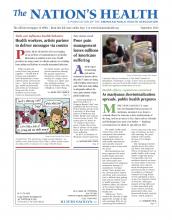Obese women may need a continuous or slightly higher dose of birth control pill to counteract the negative effects obesity has on a pill’s drug levels, a recent study said.
Having a higher body mass index may affect how long it takes for the hormones in a birth control pill to prevent ovulation, according to a study published online June 27 in Contraception.
A higher BMI may mean that forgetting to take a pill could be a bigger deal, said Ganesh Cherala, PhD, a study author and assistant professor at Oregon State University and Oregon Health and Science University’s College of Pharmacy.
“It opens up a window of opportunity for drug failure among obese women,” Cherala told The Nation’s Health.
The study looked at more than 30 obese women between the ages of 18 and 35. First, the women did two cycles of low-dose pills for 21 days with a normal weeklong pill-free period. Then the women were split into two groups: One group took a continued dose of birth control pills while the other took a slightly higher dose — but still low dose — of pills with one pill-free week.
Only 9 percent of the women had potential ovulation after either taking a continuous dose of pills or a higher dose, compared to 45 percent of the women during the two 21-day pill cycles, the study said.
“There are already studies showing that normal BMI women may have better efficacy with shortening or eliminating the pill-free interval,” said Alison Edelman, MD, MPH, a study author and associate professor at Oregon Health and Science University’s Department of Obstetrics and Gynecology. “Now I think we can say in any woman no matter what her weight, if she wanted to use pills, it looks like continuous dosing is probably going to give her better efficacy than cyclic dosing.”
Edelman said it is important that the birth control pill works as well it can for women of all sizes because she wants women to have choices when it comes to reproductive health.
She added that she and fellow doctors changed the way they counsel women, leading the discussion with the best methods for pregnancy prevention — such as using an intrauterine device or an implant — but still discuss other methods such as the pill to accommodate a patient’s choices.
For more information, visit www.contraceptionjournal.org/article/S0010-7824%2814%2900356-4/abstract.
- Copyright The Nation’s Health, American Public Health Association









